PUBLISHED
July 13, 2025
KARACHI:
The war in Gaza has unfolded in real time, pixel by pixel, on the world’s screens — and with it, a catalogue of suffering so vast it defies human comprehension. Nearly two years since it began, Israeli bombardment has reduced the Palestinian enclave to rubble. Entire neighbourhoods have been erased – families buried beneath collapsed homes – children starved, and civilians crushed under the weight of an unrelenting assault. And yet, despite an international arrest warrant against Benjamin Netanyahu, global powers remain paralysed, divided — or simply unwilling — to bring the Israeli prime minister to account.
Amid the devastation — and the moral inertia of global leadership — a handful of voices have remained consistent, cutting through the fog of war and the machinery of denial. Among the most unwavering is Francesca Albanese, the UN’s special rapporteur on human rights in the Palestinian territories occupied since 1967 — a role that has now placed her squarely in the crosshairs of the United States.
Her latest submission to the UN Human Rights Council not only urges the International Criminal Court to investigate Israeli officials and American companies allegedly complicit in war crimes, but also challenges the broader global indifference to the unfolding catastrophe in Gaza. Now facing unprecedented sanctions from the Trump administration, a move legal experts widely see as an attempt to silence international voices willing to label the Gaza assault as genocide, she has become a flashpoint in the battle over how global law responds to atrocity and human suffering.
Released earlier this month, her findings call for sweeping sanctions and an arms embargo on Israel, alongside legal accountability for multinational corporations she accuses of “profiting from genocide” in Gaza. Titled From Economy of Occupation to Economy of Genocide, the dossier traces how global businesses have enabled Israel’s military campaign — from weapons and surveillance tech to financial services and heavy machinery.
“While political leaders and governments shirk their obligations, far too many corporate entities have profited from Israel’s economy of illegal occupation, apartheid and now, genocide,” the report notes. “The complicity exposed… is just the tip of the iceberg – ending it will not happen without holding the private sector accountable, including its executives.”
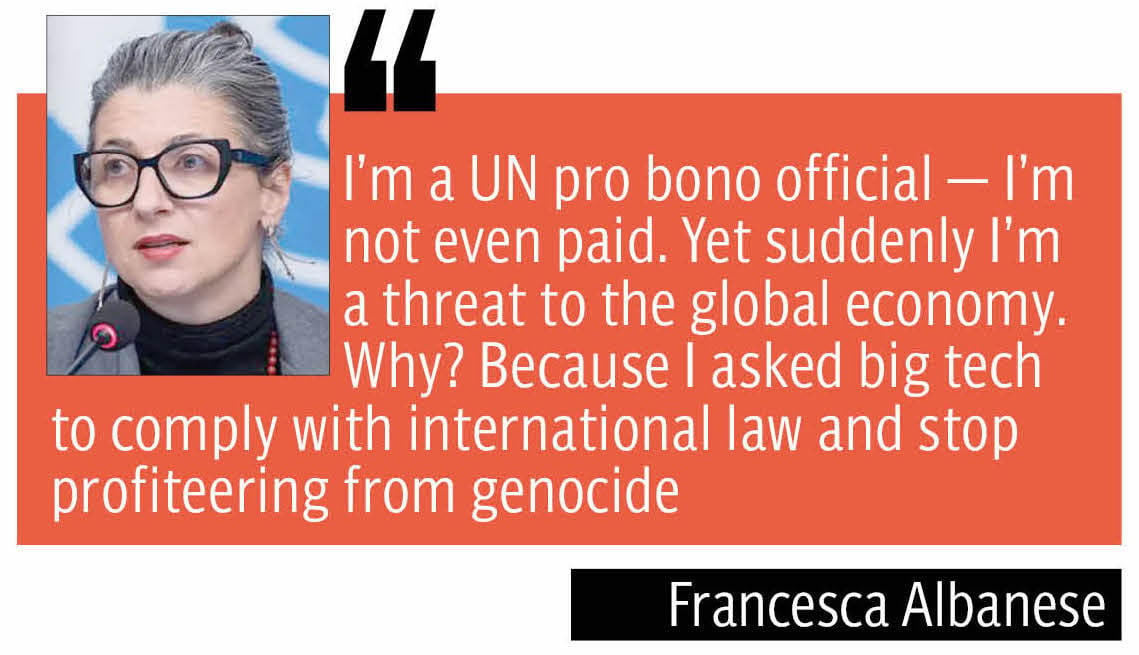
The Israeli military, it argues, has benefited from “the largest ever defence procurement programme” for the F-35 fighter jet, manufactured by Lockheed Martin with inputs from more than 1,600 companies across eight countries. Israel was the first to fly the jet in “beast mode,” carrying 18,000 pounds of bombs per mission.
Just days before Albanese’s findings were made public, the UK High Court upheld the legality of British exports of F-35 components to Israel — even while acknowledging that the parts could be used in “a serious violation of international humanitarian law in the conflict in Gaza.” As the Guardian reported, the court ultimately deferred to ministers and parliament on what it called a politically sensitive matter.
In the US, a Lockheed Martin spokesperson told the media that foreign military sales are government-to-government transactions and best addressed by the government. On its website, the defence giant boldly stated that it is “proud of the significant role it has fulfilled in the security of the state of Israel.”
Another firm under scrutiny is the US-based tech company Palantir, which has established a close partnership with the Israel Defense Forces (IDF). The company signed a strategic agreement to assist with “war-related missions” and provides battlefield decision-making software. However, Palantir, the Guardian reports, denies involvement in specific targeting systems such as the IDF’s Lavender or Gospel programmes, and did not respond to the report released by the UN rapporteur.
The web of commercial entanglements, Albanese contends, extends far beyond arms and tech.
Her documentation also details the role of construction and heavy machinery manufacturers such as Caterpillar and Volvo, whose equipment has allegedly been used in mass demolitions of homes, mosques and civilian infrastructure in Gaza and the West Bank. Despite repeated calls from human rights organisations, these firms have continued supplying the Israeli market, turning “passive suppliers” into “deliberate contributors to a system of displacement.”
Caterpillar, the Guardian noted, declined to comment. Volvo, in response to the same outlet, said much of the equipment in use had been acquired through the secondhand market, beyond its control. A spokesperson added that Volvo’s local partner, Merkavim, is contractually obliged to comply with human rights standards — though Albanese notes the company is listed in a UN database of businesses operating in Israeli settlements. Under international law, she argues, Volvo’s due diligence should compel an immediate withdrawal.
Beyond hardware and logistics, the analysis also zeroes in on how Israel’s war effort is being quietly sustained through global finance. It exposes how leading financial institutions — including BNP Paribas and Barclays — helped underwrite Israeli government bonds, boosting investor confidence and easing borrowing costs. Asset management giants such as Pimco (a subsidiary of Allianz) and Vanguard are also identified as major bondholders. While Pimco declined to comment, Vanguard stated it complies with all relevant laws and expects companies in conflict zones to carry out enhanced human rights due diligence.
Ironically, even as Norway voices support for Gaza, its own sovereign wealth fund — the Government Pension Fund Global, the largest of its kind in the world — has increased its holdings in Israeli firms by 32% since the war began. While the fund attributes this rise to market performance rather than fresh investment, the UN report urges institutional investors to reconsider their financial entanglements with companies implicated in the conflict.
To strengthen her recommendations, Albanese invokes historical precedents — including the prosecution of industrialists at the post-Second World War IG Farben trial, and South Africa’s Truth and Reconciliation Commission, which scrutinised corporate complicity in apartheid. She also cites the UN’s Guiding Principles on Business and Human Rights, adopted in 2011, which require companies to prevent and remedy rights violations linked to their operations.
But even as Albanese grounds her work in documented evidence, the Trump administration — which had promised to end the war in Gaza “within days” upon returning to the White House — has chosen to target her. And she isn’t the first. Experts view these actions as retaliation not only for Albanese’s vocal and uncompromising criticism of the atrocities unfolding in the Palestinian enclave, but also as part of a broader assault on the UN — the institution she represents — and on anyone, individual or organisation, that dares to call out Israel’s conduct in Gaza.

“Trump’s sanctions on Francesca Albanese are an outrageous attempt to censor criticism of Israeli atrocities in Gaza,” said Kenneth Roth, former executive director of Human Rights Watch. “They show the depths to which Trump will stoop to defend Israel’s indefensible conduct — first imposing sanctions on the International Criminal Court prosecutor for bringing war-crime charges (as well as two judges for affirming them), then on a UN rapporteur for fairly reporting on Israel’s genocide.”
Roth described the sanctions as “a brazen assault on the UN system — an illustration of transnational repression that, in any other context, the Trump administration would be quick to denounce.” He cautioned that “every UN rapporteur must now worry about suddenly having their bank accounts frozen if they speak a truth of which Trump disapproves.”
Albanese, however, has emerged undeterred — even with a target placed squarely on her back by Washington. She has drawn support from across the international spectrum for doing what many have been too cautious, or too complicit, to attempt.
“There is no joy, and certainly no pride, in being known as the chronicler of genocide. This must stop,” she said. “I’m a UN pro bono official — I’m not even paid. Yet suddenly I’m a threat to the global economy. Why? Because I asked big tech to comply with international law and stop profiteering from genocide.”
Amnesty International, Human Rights Watch and a dozen other leading advocacy groups have condemned the US sanctions as a shameless and transparent assault on the core principles of international justice. For Ashok Swain, professor of peace and conflict research at Uppsala University, the backlash against Albanese’s work reveals just how disruptive her findings are to a global status quo that increasingly seems more aligned with Israel than with human rights.
The power of her report, the Sweden-based academic argues, lies in its framing — not in exaggeration, but in its ability to expose the deeper, structural machinery of genocidal violence. By tying legal, political and economic systems together, Albanese breaks through decades of diplomatic silence that have enabled complicity. Challenging that silence, Swain said, would require not just political courage, but systemic reform at the UN and sustained civil society pressure to shift the conversation from humanitarian crisis to legal responsibility.
He described the US sanctions as nothing short of a retaliatory strike — not only to undermine Albanese, but to protect the corporate and strategic interests named in her findings. “Rather than engage with the evidence,” Swain said, “they’re trying to delegitimize it. That tells you exactly how high the stakes are — and just how far some states will go to shield themselves and their allies from scrutiny.”
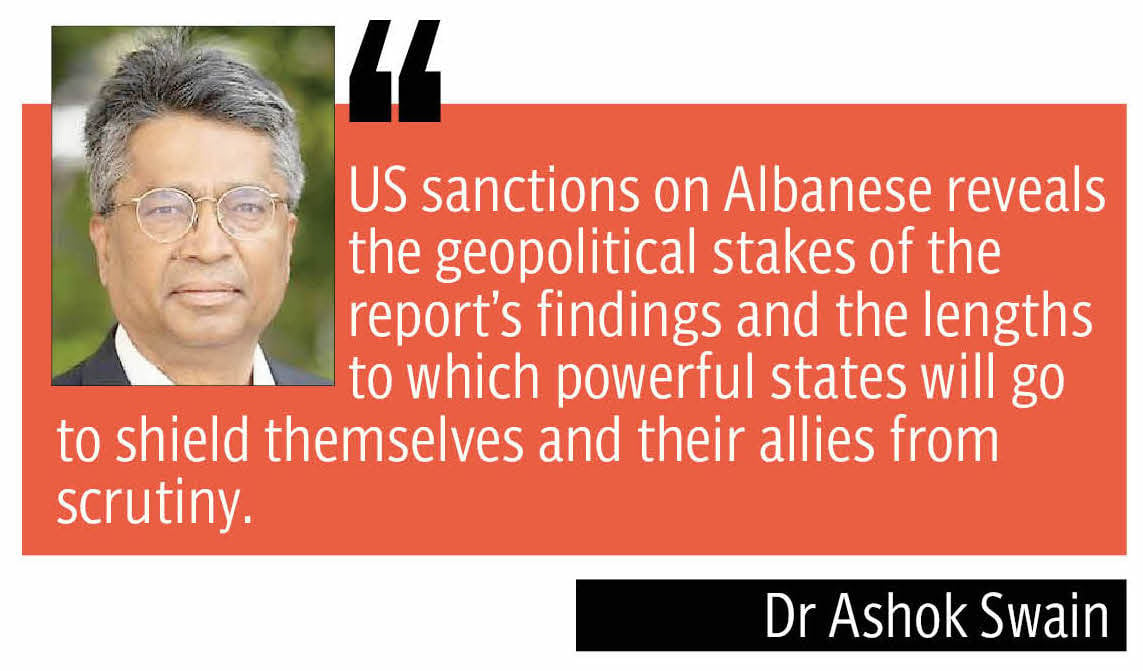
Contempt for international law
Albanese may be the latest target — but she’s unlikely to be the last. Under Trump, the US has repeatedly taken aim at institutions of international law. In early June, his administration blacklisted four International Criminal Court judges — two involved in issuing arrest warrants for Israeli leaders, including Prime Minister Benjamin Netanyahu and former defence minister Yoav Gallant, and two others who authorised a 2020 investigation into alleged US war crimes in Afghanistan. Observers have described the move as an aggressive attempt to shield both American and Israeli officials from legal scrutiny and hobble the court’s authority.
That contempt for international norms extends beyond the courtroom. Trump authorised military strikes on Iran — a sovereign state posing no imminent threat — in open defiance of the UN Charter. The international response was tepid at best.
While there may be little recourse against Washington’s travel bans, Roth argued that Trump’s effort to freeze Albanese out of the global financial system need not go unchallenged. The European Union, he pointed, has a “blocking statute” specifically designed to counter overreaching US sanctions — and should invoke it now. “Other governments must also act,” Roth added, “to ensure Albanese isn’t cut off from her own funds or denied the ability to engage in basic commerce for speaking the truth.”
Albanese’s focus on the “genocide economy”, Swain pointed out, lays bare how global companies profit from — or enable — Israeli atrocities. “That complicity needs to be called out and held to account,” he concluded.
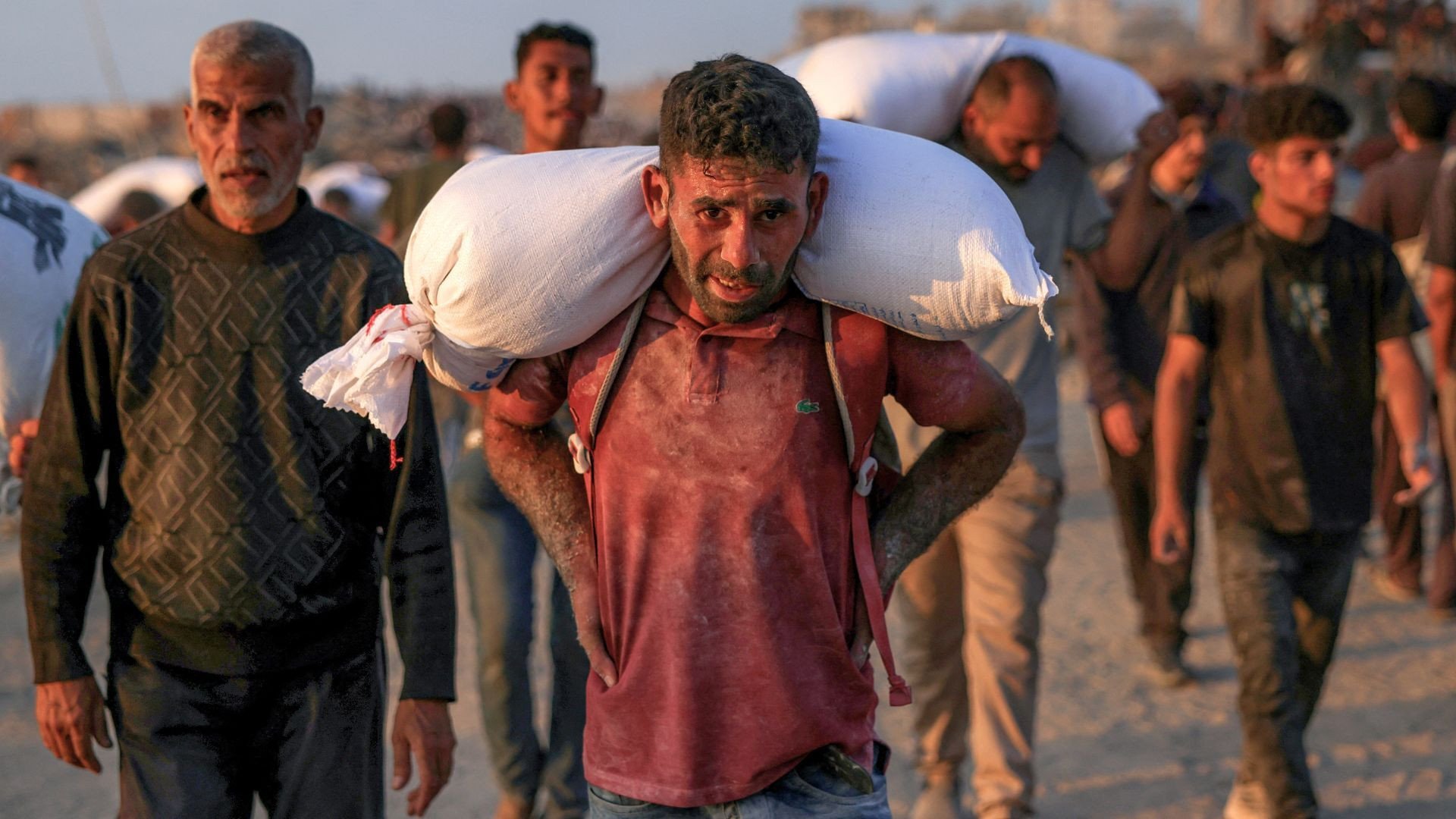
The new normal
“The rules of the institutions that define our lives bend like reeds when it comes to Israel,” Moustafa Bayoumi wrote in a recent essay for the Guardian, warning that the war in Gaza risks normalising genocide as a legitimate tool of warfare. The concern isn’t abstract. As Colin Jones reported in the New Yorker, senior figures in the US military legal establishment are watching Israel’s conduct not with alarm, but with interest — viewing the loosening of restraints on civilian casualties as a shift in precedent that could shape the contours of a future conflict with China.
But not everyone agrees that the law itself is collapsing. When asked whether Israel’s campaign risks normalising genocide as an acceptable weapon of war — or radically shifting the global line of what is permissible in modern conflict — Roth was firm in his response: “No. We should not confuse a violation of the law with an end to the law. The task now is to hold Israel to account for its flouting of the law.”
He pointed to South Africa’s genocide case against Israel at the International Court of Justice as one avenue for doing so and called on the International Criminal Court to pursue broader charges — including genocide — in addition to those already filed. “So far,” Roth noted, “the ICC has charged Israeli Prime Minister Netanyahu and former defence minister Gallant only for the war-crime strategy of starvation and deprivation.”
What is unfolding before the world is not a mystery — it is a staggering toll laid bare in numbers — more than 57,800 Palestinians killed and 138,095 wounded by Israeli attacks across Gaza since October 2023. And yet, the world remains paralysed, mired in diplomatic hedging and legalistic delay over how, or whether, to restrain Israel, if at all.
Despite the deliberate and documented use of starvation as a weapon of war, Israel has faced no meaningful censure from those who claim to uphold international law. The legal frameworks forged in the wake of past genocides, experts argue, appear to be buckling in the face of Israeli impunity. Norms meant to curb the worst of human violence are now selectively enforced — or quietly cast aside.
In this moral vacuum, those calling for accountability are punished more swiftly than those accused of committing the crimes. The international legal order — once seen as a check on power — now risks becoming a mechanism for silencing dissent, experts caution.
What comes next, Bayoumi warns in his essay, remains uncertain. “No one knows what will come to replace the international system that is currently collapsing around us,” he wrote, “but any political system that prioritises punishing those who protest against genocide rather than stopping the killing has clearly exhausted itself.”
If there is a glimmer of hope in this rage-inducing moment, he suggests, it lies in the growing number of people around the world who refuse to be silenced.
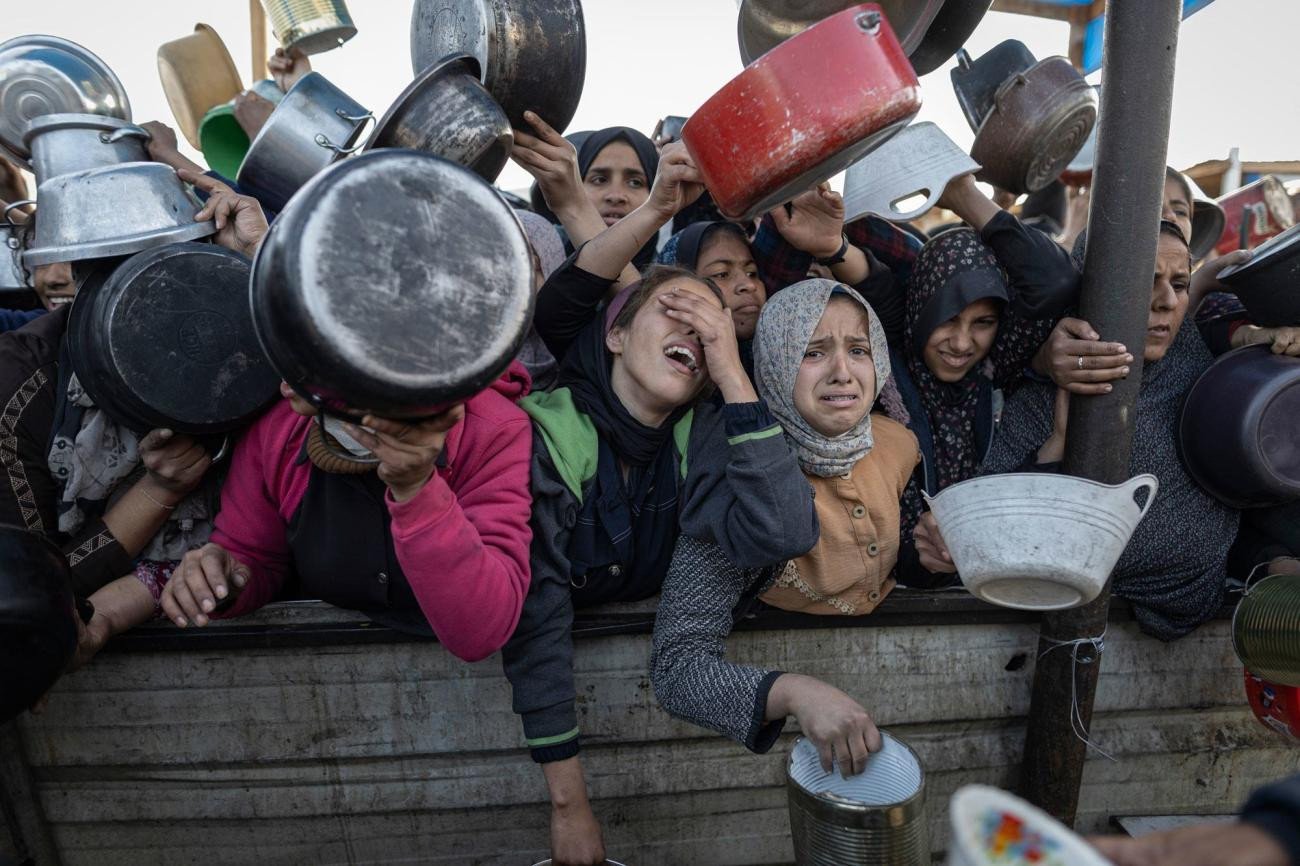
Displacement project
Gaza — the besieged and bombarded Palestinian enclave — is being imagined less as a humanitarian crisis zone and more as prime beachfront property. Not too long ago, US President Donald Trump casually floated the idea of turning the devastated strip into a “riviera” — one that would require the mass displacement of Palestinians from their own land.
But this was no offhand remark. A recent investigation by the Financial Times reveals that Boston Consulting Group (BCG), one of the world’s largest consultancy firms, spent months modelling postwar reconstruction scenarios — including a proposal to relocate more than 500,000 Gazans. The firm helped set up the Israel- and US-backed Gaza Humanitarian Foundation, supported a related security company, and worked for over seven months on the initiative, codenamed “Project Aurora.”
At one point, BCG produced financial models estimating “relocation packages” worth $9,000 per person — a $5bn scheme to clear Palestinians from the strip. Senior executives were reportedly looped in, including the firm’s chief risk officer and its head of social impact. According to the Financial Times, more than a dozen consultants worked on the plan.
The revelations, analysts argue, expose the growing influence of private consultancies and corporate actors in shaping Gaza’s future — often behind closed doors, and often in ways that echo the logic of erasure more than that of relief.
Commenting on the plan, Roth warned that forced mass displacement constitutes both a war crime and a likely crime against humanity. “No one should profit from such crimes,” he said. “Anyone who financially assists them risks prosecution for aiding and abetting.”
Swain called the displacement project deeply problematic — an attempt, he argued, to legitimise occupation through the language of reconstruction, investment, and stability. The very premise of rebuilding Gaza as a depoliticised economic zone, he said, violates international law, which prohibits an occupying power from deriving benefit and demands meaningful local agency.
Framing military conquest as an opportunity for “development,” Swain cautioned, amounts to a kind of legal laundering — one that disguises coercion and disenfranchisement as benevolence.
He added that the BCG project exemplifies a new form of neocolonialism — a technocratic vision, led by Western firms, imposed on war-torn societies without democratic consent or political resolution. By treating Gaza as a blank slate, Swain argued, such plans erase Palestinian history, rights, and sovereignty — replacing them with profit-driven notions of governance. “It continues a colonial logic,” he said, “that sees people not as political actors with agency, but as problems to be managed.”
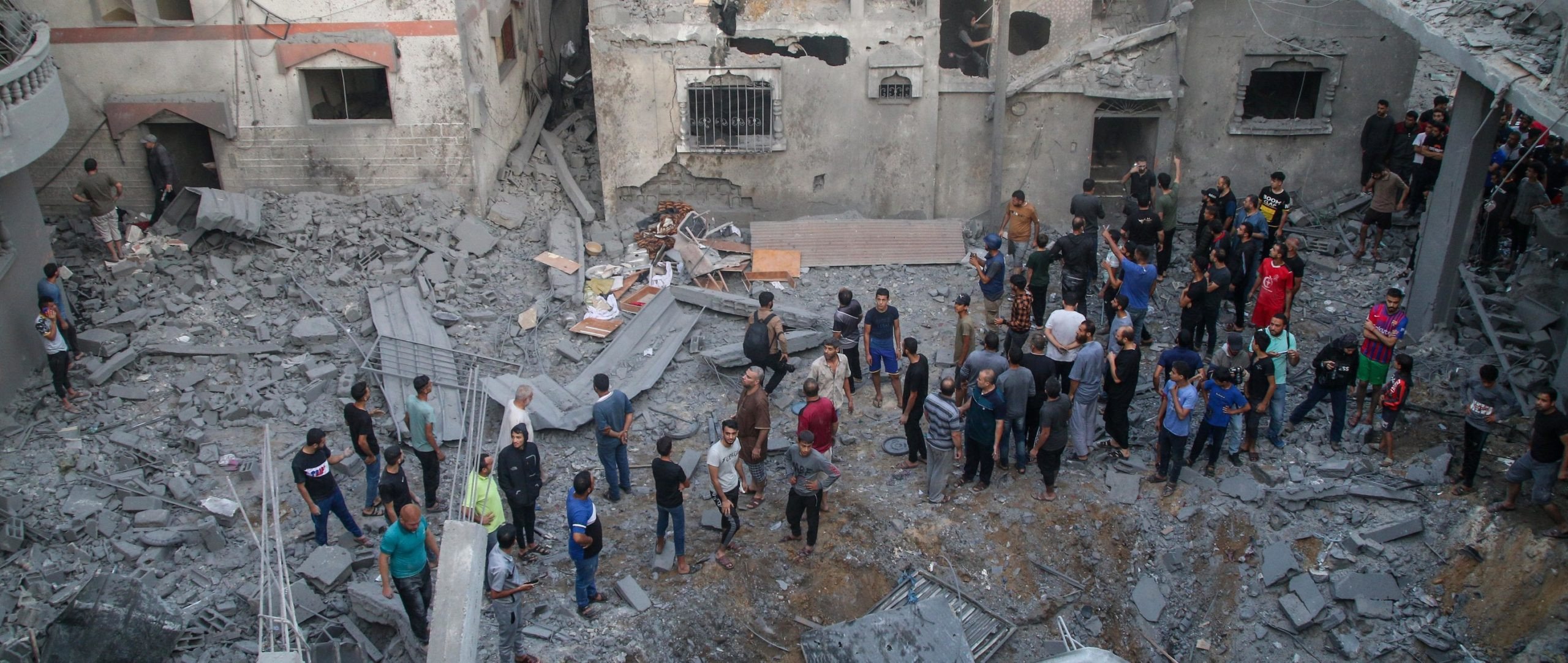
Prolonged war
In a recent report, the New York Times Magazine casts Israel’s far-right prime minister as deliberately prolonging the war in Gaza to ensure his own political survival. Despite repeated warnings from Israeli defence officials and Washington, Benjamin Netanyahu has blocked postwar proposals from his own war cabinet, fixated on military objectives, and deflected mounting international criticism.
The article highlights how Netanyahu’s approach has alienated both allies and security experts. Many within Israel’s defense establishment fear that the absence of a political solution will leave a power vacuum in Gaza, one that could fuel another generation of war. But Netanyahu continues to insist that Israel must retain indefinite “security control” of the enclave — without ever articulating what that entails. His rhetoric, centred on the total elimination of Hamas, ignores the urgent need for a political resolution, humanitarian recovery, and regional diplomacy.
This impasse, the article argues, is not strategic paralysis — it is deliberate. By refusing to end the war or define its political endgame, Netanyahu avoids elections that could unseat him and revive legal proceedings related to his corruption charges. His far-right coalition, led by ultranationalist ministers, has helped entrench this standoff, pushing for maximalist war aims while rejecting international mediation.
Critics say the consequence has been catastrophic — Gaza reduced to a battlefield with no political horizon. As humanitarian conditions grow more dire, Netanyahu’s war is increasingly viewed not as a security imperative but as a strategy for clinging to power.
Swain sees deeper design in this destruction. “The primary political and strategic beneficiary of Gaza’s devastation is the Israeli state, particularly its far-right leadership, which seeks to permanently dismantle Palestinian national aspirations,” he cautioned. But there are material incentives too. “Economically, select Israeli, American, and Gulf-based entities stand to gain from postwar reconstruction, land redevelopment, and control over natural resources,” he added.
The Sweden-based academic argues that the pattern of targeted destruction — universities, hospitals, archives, homes — suggests not collateral damage but a “deliberate long-term strategy of erasure and dispossession.” What’s unfolding, he warns, is not only a military campaign but “a blueprint for demographic engineering and economic reconfiguration under permanent military occupation.”
“This humanitarian framing conveniently sidelines the legal and political dimensions of what’s unfolding in Gaza,” warned Swain. “By avoiding the language of genocide or legal accountability, Western and Gulf states are able to deliver aid without challenging Israeli impunity — or confronting their own complicity. It’s a calculated deflection that prioritises strategic alliances and so-called stability over justice and reflects a broader unwillingness to enforce international law when it’s inconvenient,” he concluded.

